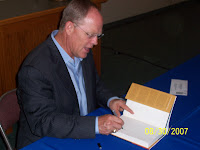His methodology makes perfect sense, because the Bible—scripture—was always read to people until relatively recently, before the printing press (and literacy) made the Bible physically accessible to everyone. If I remember correctly, Dewey said to take note of how some passages seem repetitive, possibly because the text often lends itself more to oral presentation than written presentation.
During the weekend conference, we were given a copy of the following, which I think is magnificent. We always seem to think of the warm and cuddly baby Jesus and how indescribably wonderful a gift He was. But how often do we reflect that the gift of the baby Jesus culminated at the cross?
This is meant to be spoken aloud, performed during a service or Christmas play—or Easter play, which would be equally apropos. Enjoy, and have a merry and blessed Christmas!
ONE: In those days a decree went out from Caesar Augustus that all the world should be enrolled. (This was the first enrollment when Quirinius was governor of Syria.)-- Composed by Luke's Community/Rearranged by Dennis Dewey, 1995
TWO: Pilate then called together the chief priests and the rulers and the people and said to them, "You brought me this man as one who was perverting the people; and after examining him before you, behold, I did not find this man guilty of any of your charges against him. I will therefore
chastise him and release him."
ONE: And all went to be enrolled to their own cities. And Joseph also went up from Galilee, from the city of Nazareth, to Judea, to the city of David, which is called Bethlehem, to be enrolled with Mary, his betrothed, who was with child.
TWO: But they were urgent, demanding with loud cries that he should be crucified. And their voices prevailed. So pilate gave sentence that their demand should be granted. He released Barabbas, the man who had been thrown into prison for insurrection and murder, whom they asked for, but Jesus he delivered up to their will.
ONE: And while they were there, the time came for her to be delivered.
TWO: And when they came to the place which is called the skull, there they crucified him, and two criminals--one on the right and one on the left. And Jesus said, "Father, forgive them, for they know not what they do.
ONE: And she brought forth her first-born son and wrapped him swaddling cloths...
TWO: And they cast lots to divide his garments.
ONE: ...and laid him in a manger because there was no place for them in the inn. And in that region there were shepherds out in the field, keeping watch over their flock by night.
TWO: And the people stood by, watching.
ONE: And an angel of the Lord appeared to them. And the glory of the Lord shone around them. And they were filled with fear! But the angel said to them, "Do not be afraid, for, behold, I bring you good news of great joy which shall be for all the people. For to you is born this day in the city of David a Savior, who is Christ the Lord."
TWO: But the rulers scoffed at him, saying, "He saved others! If this IS the Christ of God, God's chosen One, let him save himself!"
ONE: And this will be a sign for you...
TWO: And while the sun's light failed, the curtain of the temple was torn in two. And Jesus cried out with a loud voice, "Father, into thy hands I commit my spirit!"
ONE: ....You will find a babe wrapped in swaddling cloths...
TWO: Then Joseph of Arimathea took down the body of Jesus and wrapped it in a linen shroud...
ONE: ...and lying in a manger.
TWO: ...and laid him in a rock-hewn tomb.
[PAUSE, as the tellers switch stories]
TWO: And suddenly there was with the angel a multitude of the heavenly host, praising God and saying, "Glory to God in the highest, and earth peace among people of God's favor!"
ONE: The women who had come with Jesus from Galilee followed and saw the tomb and how his
body was laid, and returned and prepared spices and ointments.
TWO: When the angels had gone away from them into heaven, the shepherds said to one another, "Let us go over to Bethlehem and see this thing that has happened that the Lord has made known to us!"
ONE: And on the first day of the week at early dawn they went to the tomb.
TWO: And they went with haste and found Mary and Joseph, and the babe lying in a manger.
ONE: And they found the stone rolled away from the tomb! But when they went in, they did not see the body!
TWO: And when the shepherds saw the babe lying in the manger, they made known the saying which had been told them concerning the child.
ONE: While they were perplexed about this, suddenly, two men stood by them in dazzling apparel, and they said to them, "Why do you seek the living among the dead? Remember how he told you when he was still in Galilee that the Son of Man must be delivered into the hands of sinners and be crucified and on the third day rise?"
TWO: And all who heard it wondered at what the shepherds had told them. But Mary kept all these things, pondering them in her heart.
ONE: And they did remember his words, and, returning from the tomb, they told all this to the eleven and to all the rest!
TWO: And the shepherds returned, glorifying and praising God for all that they had heard and seen, just as it had been told them!
ONE: But these words seemed to them an idle tale, and they did not believe them.
(If you pass this on to anyone else, please include the credit line!)


